高中英语 外研版(2019)必修三 Unit 5 Period 3 课件
文档属性
| 名称 | 高中英语 外研版(2019)必修三 Unit 5 Period 3 课件 |  | |
| 格式 | pptx | ||
| 文件大小 | 1.5MB | ||
| 资源类型 | 试卷 | ||
| 版本资源 | 外研版(2019) | ||
| 科目 | 英语 | ||
| 更新时间 | 2022-12-04 08:58:41 | ||
图片预览

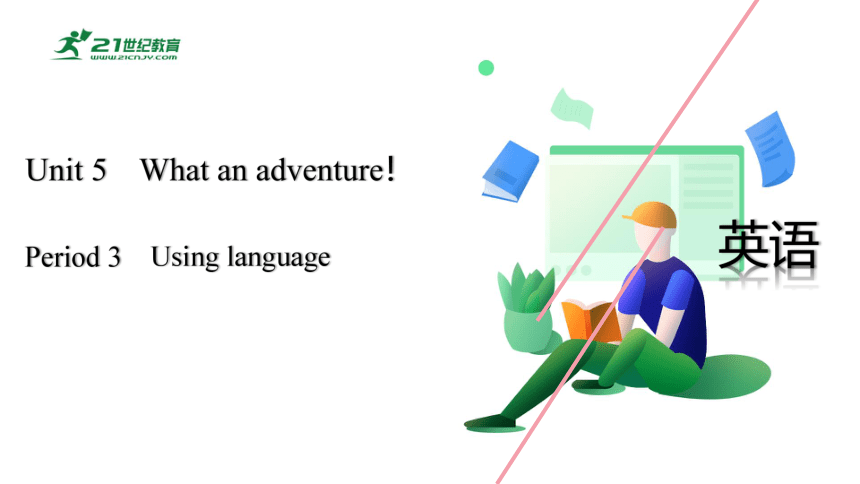
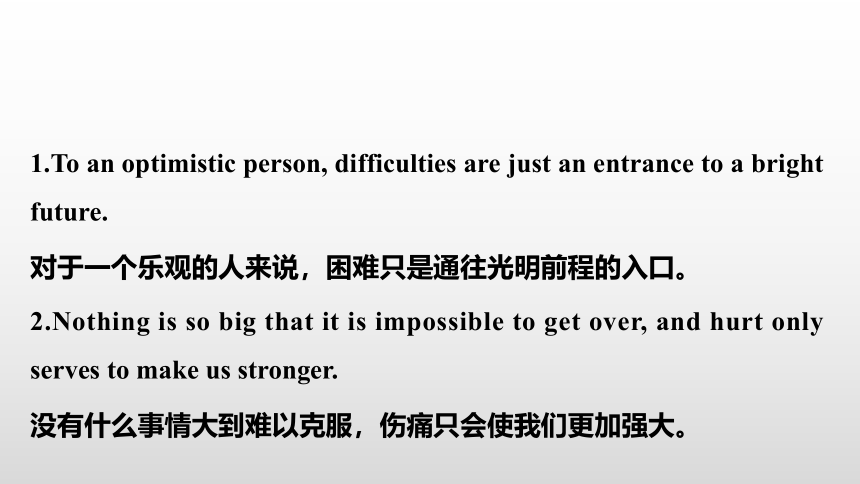
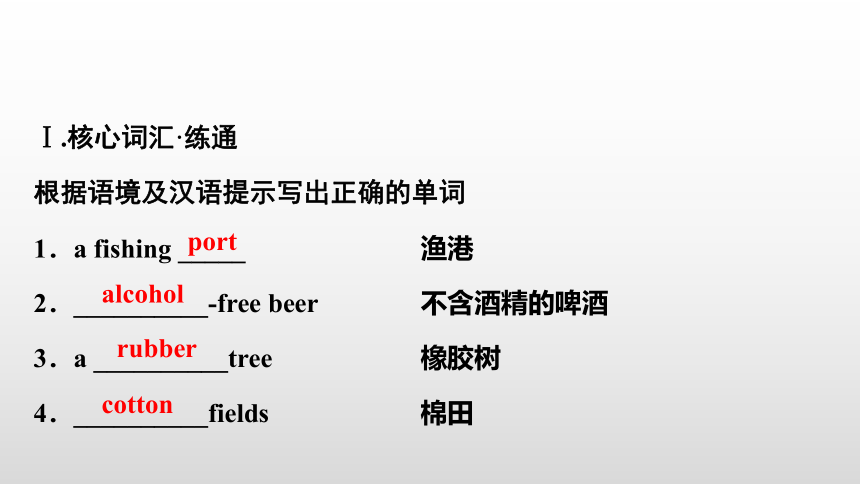
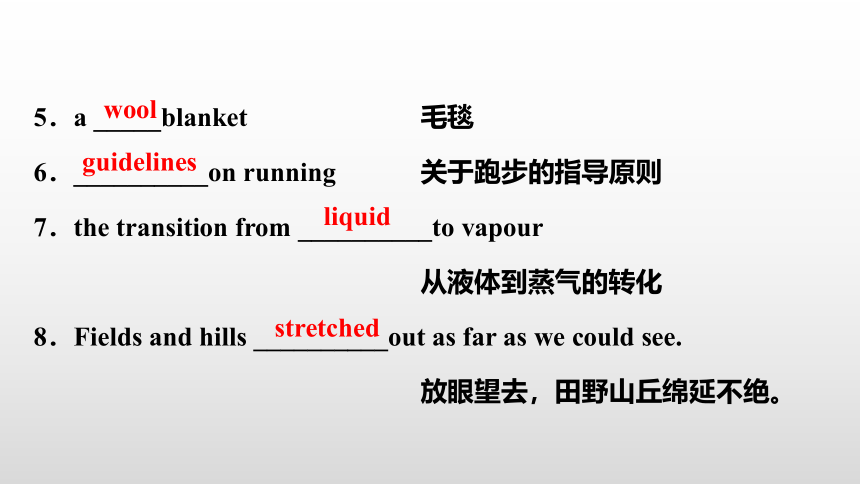
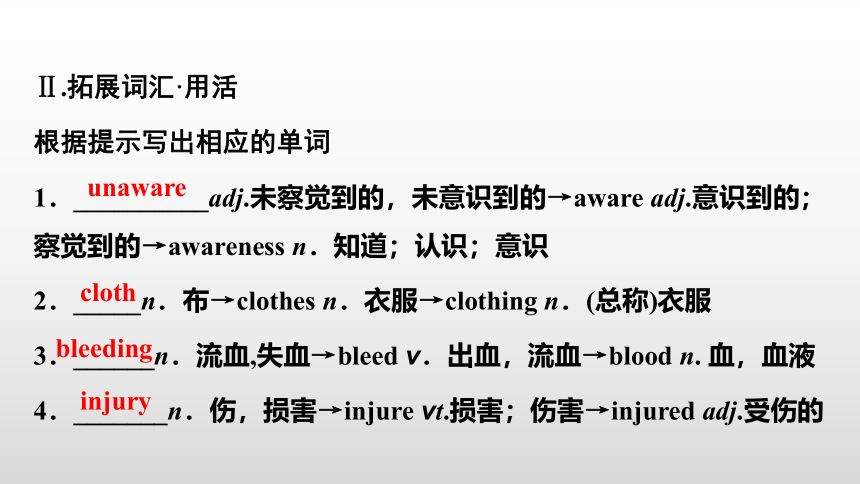
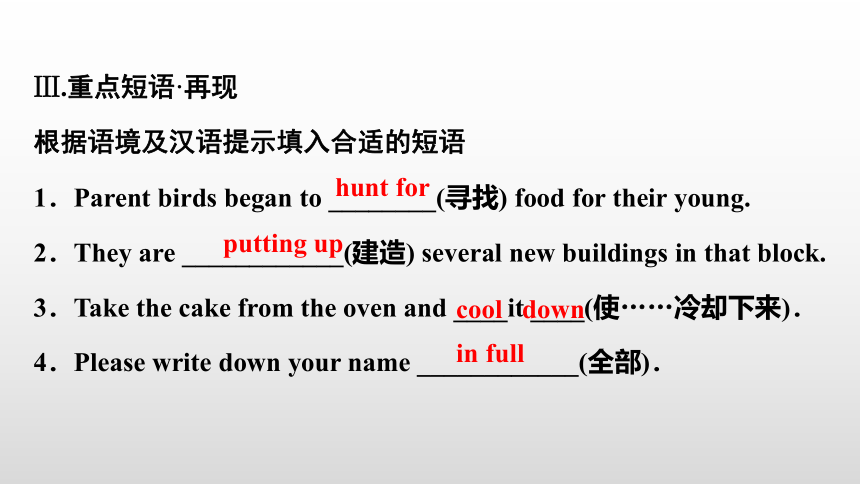
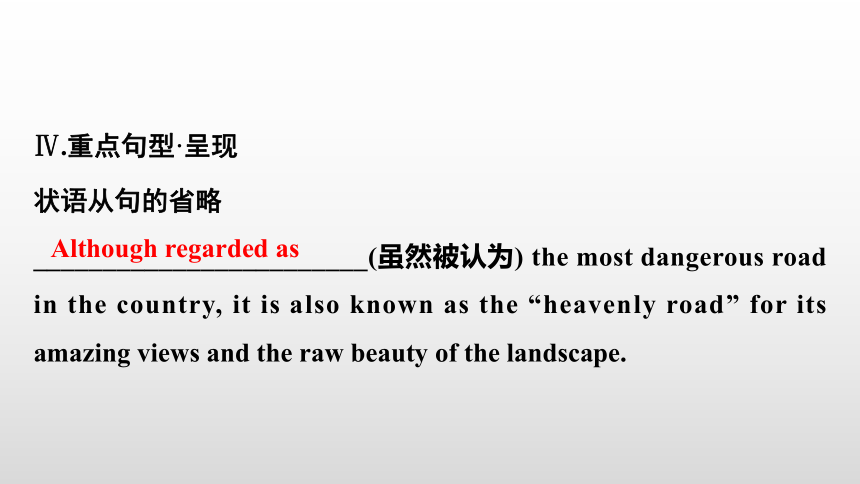
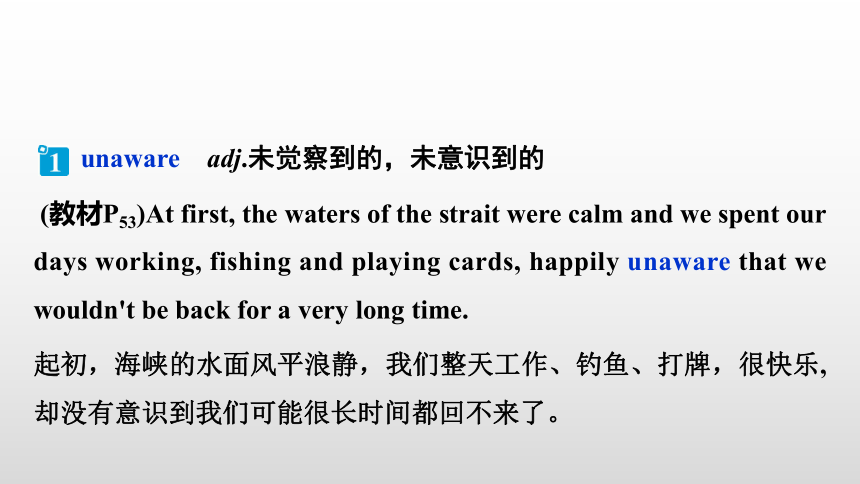
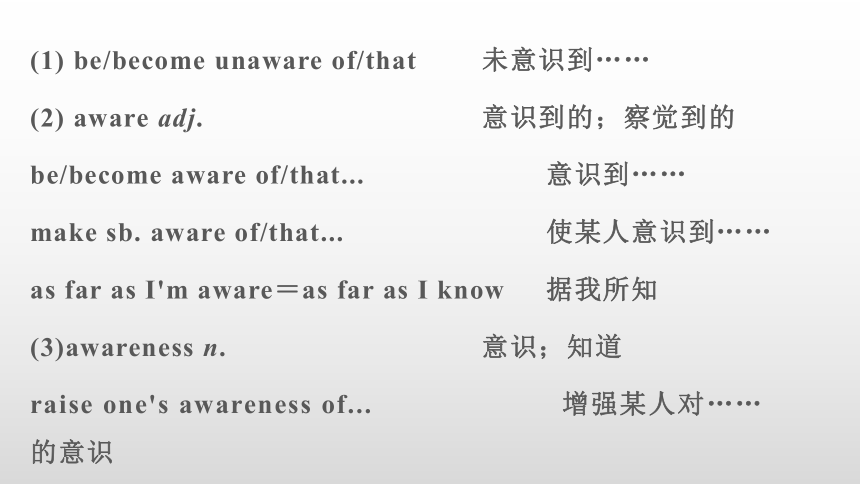


文档简介
(共43张PPT)
英语 同步课件
外研版 高中 必修第三册
英语
Unit 5 What an adventure!
Period 3 Using language
1.To an optimistic person, difficulties are just an entrance to a bright future.
对于一个乐观的人来说,困难只是通往光明前程的入口。
2.Nothing is so big that it is impossible to get over, and hurt only serves to make us stronger.
没有什么事情大到难以克服,伤痛只会使我们更加强大。
Ⅰ.核心词汇·练通
根据语境及汉语提示写出正确的单词
1.a fishing _____ 渔港
2.__________-free beer 不含酒精的啤酒
3.a __________tree 橡胶树
4.__________fields 棉田
port
alcohol
rubber
cotton
5.a _____blanket 毛毯
6.__________on running 关于跑步的指导原则
7.the transition from __________to vapour
从液体到蒸气的转化
8.Fields and hills __________out as far as we could see.
放眼望去,田野山丘绵延不绝。
wool
guidelines
liquid
stretched
Ⅱ.拓展词汇·用活
根据提示写出相应的单词
1.__________adj.未察觉到的,未意识到的→aware adj.意识到的;察觉到的→awareness n.知道;认识;意识
2._____n.布→clothes n.衣服→clothing n.(总称)衣服
3.______n.流血,失血→bleed v.出血,流血→blood n. 血,血液
4._______n.伤,损害→injure vt.损害;伤害→injured adj.受伤的
unaware
cloth
bleeding
injury
Ⅲ.重点短语·再现
根据语境及汉语提示填入合适的短语
1.Parent birds began to ________(寻找) food for their young.
2.They are ____________(建造) several new buildings in that block.
3.Take the cake from the oven and ____it ____(使……冷却下来).
4.Please write down your name ____________(全部).
hunt for
putting up
cool
down
in full
Ⅳ.重点句型·呈现
状语从句的省略
________________________(虽然被认为) the most dangerous road in the country, it is also known as the “heavenly road” for its amazing views and the raw beauty of the landscape.
Although regarded as
unaware adj.未觉察到的,未意识到的
(教材P53)At first, the waters of the strait were calm and we spent our days working, fishing and playing cards, happily unaware that we wouldn't be back for a very long time.
起初,海峡的水面风平浪静,我们整天工作、钓鱼、打牌,很快乐,却没有意识到我们可能很长时间都回不来了。
(1) be/become unaware of/that 未意识到……
(2) aware adj. 意识到的;察觉到的
be/become aware of/that... 意识到……
make sb. aware of/that... 使某人意识到……
as far as I'm aware=as far as I know 据我所知
(3)awareness n. 意识;知道
raise one's awareness of... 增强某人对…… 的意识
①He was unaware that the police were watching him.
他不知道警方在监视他。
②Tom carried on reading, seemingly unaware of my presence.
汤姆继续看书,似乎没有注意到我的存在。
[练通]——单句语法填空
(1)He has been here for a week, but I was ____________(aware) of his existence until today.
(2)As is known to all, education is a process, and people are gradually aware ______its importance.
(3)Global warming is a big concern for all and it's important to raise____________(aware) of climate change.
unaware
of
awareness
[写美]——完成句子
(4)据我所知,无人对此次失误采取任何措施。
________________________, nobody has done anything about this fault.
(5)应该让人人都知道其中的风险。
Everybody ________________________ the risks involved.
As far as I'm aware
should be made aware of
injury n.伤,损害
(教材P54)Work in pairs. Offer first aid advice for injuries or illness in Activity 5.
两人一组。为活动5中的伤病或疾病提供急救建议。
(1)injury to... 对……的伤害
do sb.an injury=do an injury to sb.
伤害某人
(2)injure v. 损害;伤害
(3)injured adj. 受伤的
the injured 伤者,伤员
be badly/seriously injured 严重受伤
①Don't do that. You'll do yourself an injury.
别那样做,你会把自己弄伤的。
②He's been out of action for 6 months with a serious knee injury.
由于膝盖损伤严重,他已经6个月没有工作了。
[练通]——单句语法填空
(1) Mike is out of the basketball team because of a terrible injury ______his head.
(2)He tried his best to comfort the ____________(injure) and told them help was on the way.
(3) __________________(injure) in the leg made it impossible for me to walk as fast as usual.
to
injured
Being injured
[写美]——完成句子
(4)如果宠物伤害他人,狗的主人应该对此负责。
Dog owners should be responsible if their pets ___________________ other people.
injure/do an injury to
过去将来时
?语法图解
?探究发现
用括号内单词的适当形式完成下面教材中的句子并体会其语法特征
1.(教材P50)Last year, hundreds of people spent good money on an experience that they knew __________________(include) crowds, discomfort and danger.
would include
2.(教材P50)Many __________________(become) sick, due to the extreme cold and low air pressure, and a few ______even ______(lose) their lives.
3.(教材P51)In 2011, words similar to those of Mallory were spoken by American mountain climber Alan Arnette, who climbed Qomolangma in that year and ________________________(climb) other high mountains around the world.
would become
would
lose
was going to climb
一、过去将来时的构成
过去将来时表示从过去某一时间来看将要发生的动作或存在的状态,常用于宾语从句中,由“would+动词原形”构成。
肯定句 主语+would+动词原形+其他
否定句 主语+would not+动词原形+其他
疑问句 Would+主语+动词原形+其他
被动句 主语+would+be+动词的过去分词
◆He said he would go to the north for the holiday.
他曾说他会去北方度假。
◆I told her the book would be returned in a few days.
我告诉她,书会在几天后还回来。
[即时演练1]——单句语法填空
(1)Scientists wanted to find out whether these new technologies ____________(work).
(2)I knew that they ____________(be) worried about me because I was so far away, and that my mother would not sleep if she knew.
would work
would be
二、过去将来时的其他形式
1.“was/were going to+动词原形”表示过去曾经打算或计划要做的事情或过去的客观迹象表明要发生的动作。
◆I thought it was going to rain.
我想天要下雨了。
◆He told me he was going to learn another foreign language.
他告诉我说,他打算学另一门外语。
2.“was/were to+动词原形”表示按过去的计划或安排将在某个过去将来时间发生的动作。
◆He said he was to finish the work in a week.
他说他将在一星期后完成这项工作。
◆We were to do whatever they told us to do.
我们将做任何他们让我们做的事。
3.“was/were about to+动词原形”表示过去即将要发生的动作。
◆We were about to go into the cinema when Mary appeared.
我们正要走进电影院时,玛丽出现了。
4.“was/were doing”表示过去将来时,用于几个表位移的动词,如leave、come、go、arrive等,表示过去预计要发生的动作。
◆David was leaving for Hawaii a few hours later.
戴维几个小时后就要去夏威夷。
[即时演练2]——单句语法填空
(1)We __________________(leave) very early so we packed the night before.
(2)I was about ____________(call) you when you came in.
(3)In a room above the store, where a party was ______________ (hold), some workers were busy setting the table.
(4)They said they __________________(go) to visit the Great Wall the next day.
were leaving
to call
to be held
were going
三、过去将来时的基本用法
1.主句为过去时,宾语从句常表示将要发生的事情。
◆We wanted to know whether she was going to speak at the meeting.
我们想知道她是否准备在会上发言。
◆He said he would stay with us.
他说他要与我们待在一起。
◆He said he would never go there again.
他说他绝不会再去那儿。
◆He didn't expect that we would all be there.
他没料到我们会都在那儿。
2.表示过去习惯性的动作。
◆During that period, he would do morning exercises every day.
在那段时间,他每天都会晨练。
3.表示过去情况中的“愿望”“倾向”,多用于否定句。
◆No matter how difficult the work was, he would keep on doing it until he accomplished it.
不管工作有多难,他总会坚持不懈地把它干完。
◆They knew that we would never permit such a thing.
他们知道我们绝不会允许发生这样的事。
4.用于虚拟语气中。
◆If I were you, I would not do that.
如果我是你的话,我就不会那样做。
◆If I had a chance to study abroad, I would study at Harvard University.
如果我有机会出国学习的话,我就会去哈佛大学。
◆I wish he would go with me to the cinema tonight.
今晚他能和我一起去看电影就好了。
[即时演练3]——完成句子
(1)没有人知道一百年之后将会发生什么事。
Nobody knew __________________ after a hundred years.
(2)无论他什么时间有空,他总是帮他妈妈做些家务活。
Whenever he had time, he __________________________________.
what would happen
would help his mother do some housework
(3)甚至在讲座结束之后,听众仍然不肯离去。
Even after the lecture ended, the audience __________________.
(4)如果他在这儿,他就会向我们展示该如何做。
If he were here, he ______________________________ it.
would not leave
would show us how to do
Ⅰ.单句语法填空
1.Just as they ____________(leave) the rebels started shelling.
2.—Do you think Mum and Dad ____________(be) late
—No, Swiss Air is usually on time.
3.The teacher said that it ____________(be) very difficult to make progress if Tom didn't work hard.
were leaving
will be
would be
4.She said she was ____________(clean) the classroom after school.
5.We discussed when the general meeting of the whole staff was ____________(hold).
6.He said that he __________________(go) to borrow books from the library the next day.
to clean
to be held
was going/would go
Ⅱ.语法与写作
1.他答应过要努力工作,没有让我失望。
He promised that he __________________, and he didn't let me down.
2.我刚要接通电脑电源,这时停电了。
I ________________________ the power of the computer when the electricity was cut off.
would work hard
was about to turn on
3.他说他退休后要住在乡下。
He said that he ______________________________ in the countryside when he retired.
4.当他要开门的时候,他发现他的钥匙不见了。
When he was __________________, he found his keys were nowhere.
5.我们被告知飞机十分钟后就要起飞。
We were told that the plane __________________in ten minutes.
was going to live/would live
to open the door
was taking off
谢谢
21世纪教育网(www.21cnjy.com)
中小学教育资源网站
兼职招聘:
https://www.21cnjy.com/recruitment/home/admin
英语 同步课件
外研版 高中 必修第三册
英语
Unit 5 What an adventure!
Period 3 Using language
1.To an optimistic person, difficulties are just an entrance to a bright future.
对于一个乐观的人来说,困难只是通往光明前程的入口。
2.Nothing is so big that it is impossible to get over, and hurt only serves to make us stronger.
没有什么事情大到难以克服,伤痛只会使我们更加强大。
Ⅰ.核心词汇·练通
根据语境及汉语提示写出正确的单词
1.a fishing _____ 渔港
2.__________-free beer 不含酒精的啤酒
3.a __________tree 橡胶树
4.__________fields 棉田
port
alcohol
rubber
cotton
5.a _____blanket 毛毯
6.__________on running 关于跑步的指导原则
7.the transition from __________to vapour
从液体到蒸气的转化
8.Fields and hills __________out as far as we could see.
放眼望去,田野山丘绵延不绝。
wool
guidelines
liquid
stretched
Ⅱ.拓展词汇·用活
根据提示写出相应的单词
1.__________adj.未察觉到的,未意识到的→aware adj.意识到的;察觉到的→awareness n.知道;认识;意识
2._____n.布→clothes n.衣服→clothing n.(总称)衣服
3.______n.流血,失血→bleed v.出血,流血→blood n. 血,血液
4._______n.伤,损害→injure vt.损害;伤害→injured adj.受伤的
unaware
cloth
bleeding
injury
Ⅲ.重点短语·再现
根据语境及汉语提示填入合适的短语
1.Parent birds began to ________(寻找) food for their young.
2.They are ____________(建造) several new buildings in that block.
3.Take the cake from the oven and ____it ____(使……冷却下来).
4.Please write down your name ____________(全部).
hunt for
putting up
cool
down
in full
Ⅳ.重点句型·呈现
状语从句的省略
________________________(虽然被认为) the most dangerous road in the country, it is also known as the “heavenly road” for its amazing views and the raw beauty of the landscape.
Although regarded as
unaware adj.未觉察到的,未意识到的
(教材P53)At first, the waters of the strait were calm and we spent our days working, fishing and playing cards, happily unaware that we wouldn't be back for a very long time.
起初,海峡的水面风平浪静,我们整天工作、钓鱼、打牌,很快乐,却没有意识到我们可能很长时间都回不来了。
(1) be/become unaware of/that 未意识到……
(2) aware adj. 意识到的;察觉到的
be/become aware of/that... 意识到……
make sb. aware of/that... 使某人意识到……
as far as I'm aware=as far as I know 据我所知
(3)awareness n. 意识;知道
raise one's awareness of... 增强某人对…… 的意识
①He was unaware that the police were watching him.
他不知道警方在监视他。
②Tom carried on reading, seemingly unaware of my presence.
汤姆继续看书,似乎没有注意到我的存在。
[练通]——单句语法填空
(1)He has been here for a week, but I was ____________(aware) of his existence until today.
(2)As is known to all, education is a process, and people are gradually aware ______its importance.
(3)Global warming is a big concern for all and it's important to raise____________(aware) of climate change.
unaware
of
awareness
[写美]——完成句子
(4)据我所知,无人对此次失误采取任何措施。
________________________, nobody has done anything about this fault.
(5)应该让人人都知道其中的风险。
Everybody ________________________ the risks involved.
As far as I'm aware
should be made aware of
injury n.伤,损害
(教材P54)Work in pairs. Offer first aid advice for injuries or illness in Activity 5.
两人一组。为活动5中的伤病或疾病提供急救建议。
(1)injury to... 对……的伤害
do sb.an injury=do an injury to sb.
伤害某人
(2)injure v. 损害;伤害
(3)injured adj. 受伤的
the injured 伤者,伤员
be badly/seriously injured 严重受伤
①Don't do that. You'll do yourself an injury.
别那样做,你会把自己弄伤的。
②He's been out of action for 6 months with a serious knee injury.
由于膝盖损伤严重,他已经6个月没有工作了。
[练通]——单句语法填空
(1) Mike is out of the basketball team because of a terrible injury ______his head.
(2)He tried his best to comfort the ____________(injure) and told them help was on the way.
(3) __________________(injure) in the leg made it impossible for me to walk as fast as usual.
to
injured
Being injured
[写美]——完成句子
(4)如果宠物伤害他人,狗的主人应该对此负责。
Dog owners should be responsible if their pets ___________________ other people.
injure/do an injury to
过去将来时
?语法图解
?探究发现
用括号内单词的适当形式完成下面教材中的句子并体会其语法特征
1.(教材P50)Last year, hundreds of people spent good money on an experience that they knew __________________(include) crowds, discomfort and danger.
would include
2.(教材P50)Many __________________(become) sick, due to the extreme cold and low air pressure, and a few ______even ______(lose) their lives.
3.(教材P51)In 2011, words similar to those of Mallory were spoken by American mountain climber Alan Arnette, who climbed Qomolangma in that year and ________________________(climb) other high mountains around the world.
would become
would
lose
was going to climb
一、过去将来时的构成
过去将来时表示从过去某一时间来看将要发生的动作或存在的状态,常用于宾语从句中,由“would+动词原形”构成。
肯定句 主语+would+动词原形+其他
否定句 主语+would not+动词原形+其他
疑问句 Would+主语+动词原形+其他
被动句 主语+would+be+动词的过去分词
◆He said he would go to the north for the holiday.
他曾说他会去北方度假。
◆I told her the book would be returned in a few days.
我告诉她,书会在几天后还回来。
[即时演练1]——单句语法填空
(1)Scientists wanted to find out whether these new technologies ____________(work).
(2)I knew that they ____________(be) worried about me because I was so far away, and that my mother would not sleep if she knew.
would work
would be
二、过去将来时的其他形式
1.“was/were going to+动词原形”表示过去曾经打算或计划要做的事情或过去的客观迹象表明要发生的动作。
◆I thought it was going to rain.
我想天要下雨了。
◆He told me he was going to learn another foreign language.
他告诉我说,他打算学另一门外语。
2.“was/were to+动词原形”表示按过去的计划或安排将在某个过去将来时间发生的动作。
◆He said he was to finish the work in a week.
他说他将在一星期后完成这项工作。
◆We were to do whatever they told us to do.
我们将做任何他们让我们做的事。
3.“was/were about to+动词原形”表示过去即将要发生的动作。
◆We were about to go into the cinema when Mary appeared.
我们正要走进电影院时,玛丽出现了。
4.“was/were doing”表示过去将来时,用于几个表位移的动词,如leave、come、go、arrive等,表示过去预计要发生的动作。
◆David was leaving for Hawaii a few hours later.
戴维几个小时后就要去夏威夷。
[即时演练2]——单句语法填空
(1)We __________________(leave) very early so we packed the night before.
(2)I was about ____________(call) you when you came in.
(3)In a room above the store, where a party was ______________ (hold), some workers were busy setting the table.
(4)They said they __________________(go) to visit the Great Wall the next day.
were leaving
to call
to be held
were going
三、过去将来时的基本用法
1.主句为过去时,宾语从句常表示将要发生的事情。
◆We wanted to know whether she was going to speak at the meeting.
我们想知道她是否准备在会上发言。
◆He said he would stay with us.
他说他要与我们待在一起。
◆He said he would never go there again.
他说他绝不会再去那儿。
◆He didn't expect that we would all be there.
他没料到我们会都在那儿。
2.表示过去习惯性的动作。
◆During that period, he would do morning exercises every day.
在那段时间,他每天都会晨练。
3.表示过去情况中的“愿望”“倾向”,多用于否定句。
◆No matter how difficult the work was, he would keep on doing it until he accomplished it.
不管工作有多难,他总会坚持不懈地把它干完。
◆They knew that we would never permit such a thing.
他们知道我们绝不会允许发生这样的事。
4.用于虚拟语气中。
◆If I were you, I would not do that.
如果我是你的话,我就不会那样做。
◆If I had a chance to study abroad, I would study at Harvard University.
如果我有机会出国学习的话,我就会去哈佛大学。
◆I wish he would go with me to the cinema tonight.
今晚他能和我一起去看电影就好了。
[即时演练3]——完成句子
(1)没有人知道一百年之后将会发生什么事。
Nobody knew __________________ after a hundred years.
(2)无论他什么时间有空,他总是帮他妈妈做些家务活。
Whenever he had time, he __________________________________.
what would happen
would help his mother do some housework
(3)甚至在讲座结束之后,听众仍然不肯离去。
Even after the lecture ended, the audience __________________.
(4)如果他在这儿,他就会向我们展示该如何做。
If he were here, he ______________________________ it.
would not leave
would show us how to do
Ⅰ.单句语法填空
1.Just as they ____________(leave) the rebels started shelling.
2.—Do you think Mum and Dad ____________(be) late
—No, Swiss Air is usually on time.
3.The teacher said that it ____________(be) very difficult to make progress if Tom didn't work hard.
were leaving
will be
would be
4.She said she was ____________(clean) the classroom after school.
5.We discussed when the general meeting of the whole staff was ____________(hold).
6.He said that he __________________(go) to borrow books from the library the next day.
to clean
to be held
was going/would go
Ⅱ.语法与写作
1.他答应过要努力工作,没有让我失望。
He promised that he __________________, and he didn't let me down.
2.我刚要接通电脑电源,这时停电了。
I ________________________ the power of the computer when the electricity was cut off.
would work hard
was about to turn on
3.他说他退休后要住在乡下。
He said that he ______________________________ in the countryside when he retired.
4.当他要开门的时候,他发现他的钥匙不见了。
When he was __________________, he found his keys were nowhere.
5.我们被告知飞机十分钟后就要起飞。
We were told that the plane __________________in ten minutes.
was going to live/would live
to open the door
was taking off
谢谢
21世纪教育网(www.21cnjy.com)
中小学教育资源网站
兼职招聘:
https://www.21cnjy.com/recruitment/home/admin
